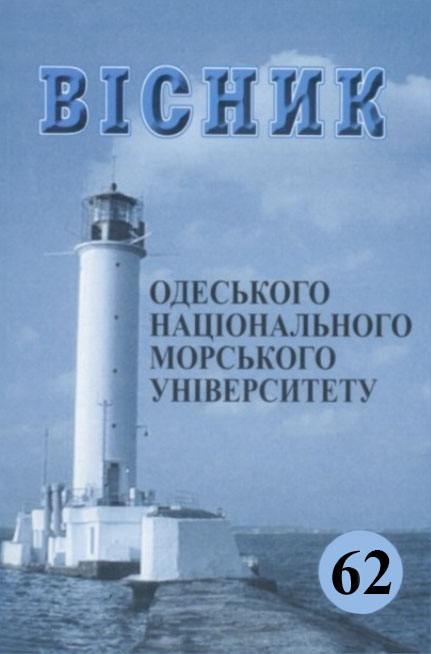Improving the fuel economy of marine diesel engines
Main Article Content
Abstract
The questions of increasing the fuel efficiency of marine diesel engines by using fuel additives are considered. As a method of preparing fuel for use in a diesel engine, chemical treatment (the use of fuel additives) is proposed. Difficulties due to which the use of fuel additives in marine power engineering are not widely used are indicated. It is noted that the use of fuel additives is especially relevant for ship auxiliary engines, which ensure the operation of electric generators. These types of engines are characterized by an increased (compared to the main engines) crankshaft rotation speed, as well as continuous operation as part of a ship’s power plant (both in running and in special modes of operation of the vessel). The first (increased frequency) reduces the fuel injection time, the second (work during parking in the seaport waters) imposes additional requirements for ensuring environmental performance of engines. It was determined that it is for these diesels that the use of fuel additives is the main way to increase fuel economy. The results of experimental studies that were performed on 6N21L marine medium speed diesels manufactured by Yanmar of a marine vessel with a deadweight of 51200 tons. The fuel systems of two diesel engines were additionally equipped with a flow meter and an additive dispenser, which ensured that the additive with different concentrations was added to the volume of fuel that enters the high pressure fuel pumps. It has been established that through the use of fuel additives in various operating modes of the specified marine diesel it is possible to achieve a reduction in specific fuel consumption from 2,6 to 4,8 %. In this case, the maximum increase in fuel efficiency occurs in the range of 50-60 % of the diesel load, that is, the modes characterized by the longest operating period of operation, as well as increased thermal tension. It was also revealed that the use of fuel additives helps to reduce the temperature of the exhaust gases by 3,3-7,2 % and by 46,2-58,3 % reduces the inconsistency of the temperature of the exhaust gases in individual diesel cylinders.
Article Details
References
2. Sagin, S.V., Solodovnikov, V.G. (2014) Primenenie ultrazvukovoj obrabotki topliva dlya snizheniya sernistogo iznosa dvigatelya [The use of ultrasonic fuel treatment to reduce engine sulfur wear]. Materials of the XXXV international scientific-practical conference «Technical science – from theory to practice», Novosibirsk: SibAK, no. 6(31), pp. 42-48.
3. Zablotsky, Yu.V., Sagin, S.V. (2016) Enhancing Fuel Efficiency and Environmental Specifications of a Marine Diesel When using Fuel Additives. Indian Journal of Science and Technology, vol. 9, no. 46, pp. 353-362. DOI: 10.17485/ijst/2016/v9i46/107516.
4. Sagin, S.V., Zablotsky, Yu.V. (2012) Ispolzovanie toplivnyh prisa-dok v sudovyh dizelyah [Use of fuel additives in marine diesel engines]. Sudovye energeticheskie ustanovki : nauchno-tehnicheskij sbornik, no. 30, pp. 180-186.
5. Spirkin V.G., Tkachev I.I., Tataryshkina P.A. (2009) Ekologiche-skie problemy primeneniya topliv s prisadkami [Environmental problems of the use of fuels with additives]. Vestnik nacionalnogo aviacionnogo universiteta, vol. 1, no. 38, pp. 68-79. (in Russian)
6. Sagin, S.V., Zablotsky, Yu.V. (2011) Opredelenie tribotehnicheskih harakteristik poverhnostej po stepeni uporyadochennosti pri-stennyh sloev uglevodorodnyh zhidkostej [Determination of tribological characteristics of surfaces according to the degree of ordering of wall layers of hydrocarbon fluids]. Problemy texniky: naukovo-vyrobnychj zhurnal, no. 3, pp. 78-88.
7. Popovskii, A.Yu., Sagin, S.V. (2014) Kompleksnaya ocenka eks-pluatacionnyh harakteristik smazochnyh uglevodorodnyh zhid-kostej [Comprehensive performance assessment of lubricating hydrocarbon fluids]. Avtomatizaciya sudovyh tehnicheskih sredstv: nauchno-tehnicheskij sbornik, no. 20, pp. 74-83.
8. Zablotsky, Yu.V., Kuropyatnyk, O.A. (2017) Povyshenie toplivnoj ekonomichnosti i ekologicheskih parametrov raboty sudovyh dizelej pri ispolzovanii prisadok k toplivu [Improving fuel economy and environmental performance of marine diesel engines using fuel additives]. Austria-science, no. 2, pp. 83-88.
9. Kuropyatnyk, O.A., Sagin, S.V. (2018) Upravlenie vypusknymi gazami sudovyh dizelej dlya obespecheniya ekologicheskih poka-zatelej [Controlling the exhaust gases of marine diesel engines to ensure environmental performance]. Avtomatizaciya sudovyh tehnicheskih sredstv: nauchno-tehnicheskij sbornik, no.24, pp. 72-80.
